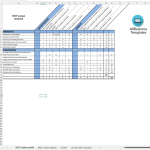Swot Analysis Chart
Save, fill-In The Blanks, Print, Done!

Download Swot Analysis Chart
Adobe Acrobat (.pdf)- This Document Has Been Certified by a Professional
- 100% customizable
- This is a digital download (8.22 kB)
- Language: English
- We recommend downloading this file onto your computer.
- Determine the advantages of your business: Start by identifying the advantages of your business. This could be anything that gives you an edge over your rivals, such as a trained workforce, a well-known brand, cutting-edge items, or devoted clients.
- Analyze the weaknesses of your business: List the shortcomings of your organization next. Everything that puts you at a disadvantage could be one of them, including old technology, a lack of resources, subpar management, or a weak brand.
- Determine the opportunities for your business: Search for external elements that can support the expansion or profitability of your company. It might be anything that offers a chance for growth, such developing markets, shifting consumer preferences, or technological advancements.
- Determine the threats to your company: Look for outside influences that could hurt your company or reduce its profitability. Everything that poses a risk, including competition, economic downturns, shifting rules, or natural calamities, could be one of them.
- Examine the mentioned criteria and assess how they effect your firm as you analyze the SWOT analysis. Determine which of the criteria can be changed if you want to succeed.
- Create a strategy: Using the knowledge from the SWOT analysis, create a strategy to deal with the important factors.
- Focus on building on your strengths, overcoming your weaknesses, leveraging your opportunities, and mitigating your threats.
- Review and update: As your company grows and develops, be sure to periodically evaluate and update your SWOT analysis. This will enable you to stay current and make sure that your selections are always well-informed.
This worksheet can help you to outline goals and strategies for your business and marketing efforts. A more advanced model, that enables you to make a strategic or detailed SWOT. is the following Strategic SWOT Excel template. This SWOT Analysis worksheet includes the basic list of four elements:
- Strengths;
- Weaknesses (or Limitations);
- Opportunities;
- Threats.
Strengths:
characteristics of the business, or project team that give it an advantage over others
Some of the strengths on the list in this template:
- reputation in the marketplace
- expertise at partner level
- services from existing branches;
- staff experienced in the end-user sector;
Weaknesses (or Limitations):
are characteristics that place the team at a disadvantage relative to others
Some of the weaknesses on the list in this template:
- too little sales or account;
- customer lists are not checked;
- no direct marketing experience;
- downtime and slow systems and processes.
Opportunities:
external chances to improve performance (e.g. make greater profits) in the environment
Some of the opportunities on the list in this template:
- little competition decisively;
- the market is open to innovations;
- export is possible;
- more suppliers on the market.
Threats:
external elements in the environment that could cause trouble for the business or project
Some of the threats on the list in this template:
- small competitors that invade the marketplace;
- very difficult to interpret market signals;
- seasonal sales;
- reputation increasingly dependent on sustainability;
- distribution channel in jeopardy.
Internal factors:
the strengths and weaknesses internal to the organization.
External factors:
the opportunities and threats presented by the external environment to the organization.
Instead, we provide this standardized SWOT analysis Chart template with text and formatting as a starting point to help professionalize the way you are working. Our private, business and legal document templates are regularly screened by professionals. If time or quality is of the essence, this ready-made template can help you to save time and to focus on the topics that really matter! If you are looking for a more professional SWOT, click here.
DISCLAIMER
Nothing on this site shall be considered legal advice and no attorney-client relationship is established.
Leave a Reply. If you have any questions or remarks, feel free to post them below.
Related templates
Latest templates
Latest topics
- Excel Templates
Where do I find templates for Excel? How do I create a template in Excel? Check these editable and printable Excel Templates and download them directly! - GDPR Compliance Templates
What do you need to become GDPR compliant? Are you looking for useful GDPR document templates to make you compliant? All these compliance documents will be available to download instantly... - Google Docs Templates
How to create documents in Google Docs? We provide Google Docs compatible template and these are the reasons why it's useful to work with Google Docs... - IT Security Standards Kit
What are IT Security Standards? Check out our collection of this newly updated IT Security Kit Standard templates, including policies, controls, processes, checklists, procedures and other documents. - Letter Format
How to format a letter? Here is a brief overview of common letter formats and templates in USA and UK and get inspirited immediately!
cheese



